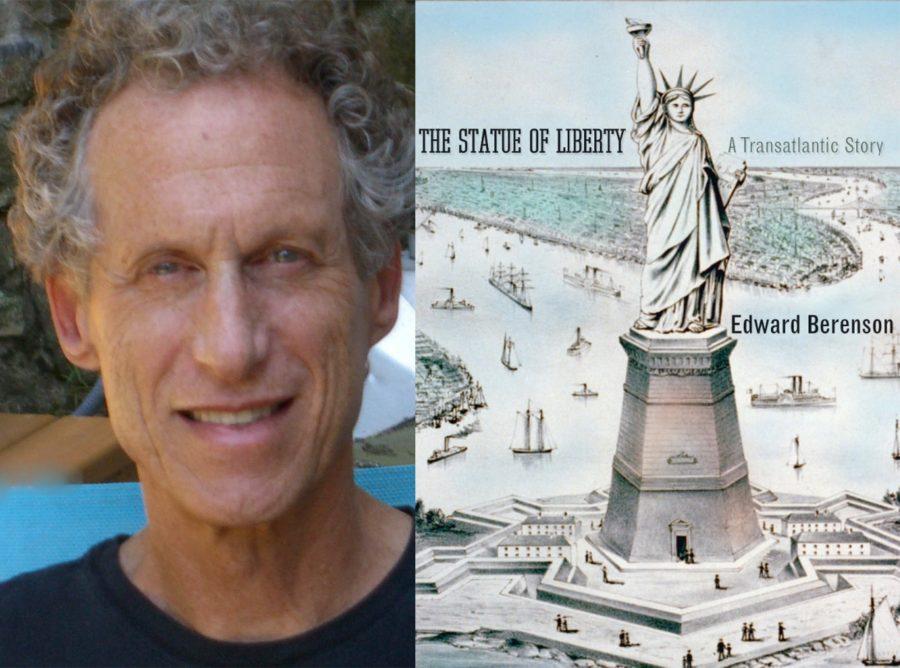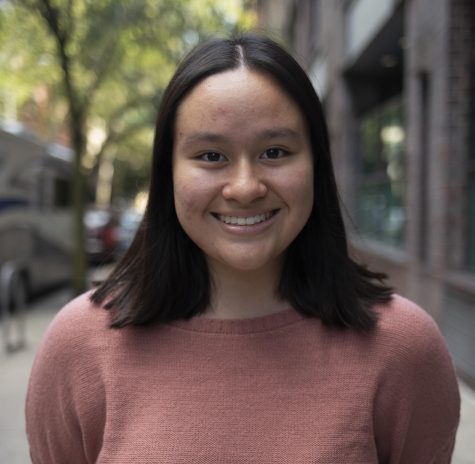Hear Thy Word
History Professor, Edward Berenson, and his book “The Statue of Liberty. A Transatlantic Story.” Berenson is one of many professors who set their own work as required reading for their course.
March 22, 2017
As the largest independent research university in the nation, NYU counts many active, distinguished researchers among its faculty. Most teaching staff have either already conducted research, are currently undertaking it or both. So it’s expected that many professors assign their own books or published research as required readings for their classes.
History 101, for example, is taught by professors Edward Berenson and Andrew Needham this semester. One of the required readings for the course is three — of twelve — chapters from Berenson’s book, “The Statue of Liberty: A Transatlantic Story.” Berenson says assigning part of his book as reading sets the groundwork for his lectures just as effectively as a required reading by a different author would. It also allows him to devote more time in class to discussing other subjects.“By having students read a portion of my book, I can cover other material in lecture, especially the wonderful visual material — photographs, political cartoons, movie stills and the like — for which the three chapters I assigned provided some background and context,” Berenson said.
However, Tisch junior Kyle Schmidt feels that reading a professor’s textbook is like hearing from the same person twice.
“I sometimes feel it is unnecessary to read the book because the teacher has already clearly established the same ideas in class,” Schmidt said. “This often makes me assume I have already heard the same rhetoric on the subject matter.”
Berenson understands professors might be imposing their views on students when they assign their own books, but he believes the nature of research itself — particularly the necessity of consulting other experts and past research in the field — prevents this streamlining of perspective.
“One professor shouldn’t monopolize the conversation,” Berenson said. “I would add though that, in both our lectures and published books, we [as professors] rarely limit ourselves to our own ideas and research. We almost always bring in the work of others. So, even when we assign books we’ve published, we simultaneously introduce students to intellectual voices different from our own.”
Sometimes, because other readings are assigned, students find their professors’ books to be useless.
“One professor insisted we buy his book, but we in fact never used it for the class,” Schmidt said. “I don’t necessarily think that all professors who sell their own textbooks are self-centered. However, that does seem to be the case sometimes.”
On the whole, Berenson sees no harm in professors bringing their own work to class, as long as the text is carefully selected.
“I try to choose readings that students will find illuminating and accessible,” Berenson said. “If a book I’ve written seems to fit that bill, I think it’s okay to assign it — or at least small parts of it, as I’ve done this semester.”
CAS junior Madeline Bello believes there are unique advantages and challenges arise when professors assign their own books, but perhaps the most salient factor for many college students is cost.
“Sometimes, professors’ books are only available at the bookstore or a specific publisher,” Bello said. “This limits students’ purchasing options, forcing them to pay top dollar for books they often cannot find used or for rent.”
Besides the obscurity and price of some of these books, students often face another difficulty in these situations — namely the need to interpret the text the way the author intended since the author is the same person grading the paper.
“Students can get stuck between a rock and a hard place, questioning whether or not their analysis matches what the author is trying to say,” Bello said.
Yet, students can benefit from professors assigning their own work, too.
“Having the professors’ work assigned gives us major insight into their stance on the topic, something that may not be conveyed in lecture,” Bello said. “This helps us know what they want us to pay particular attention to.”
As this trend becomes more common, many more students will find themselves as their professor’s guinea pigs.
Email Sarah Jackson at [email protected].
























































































































































